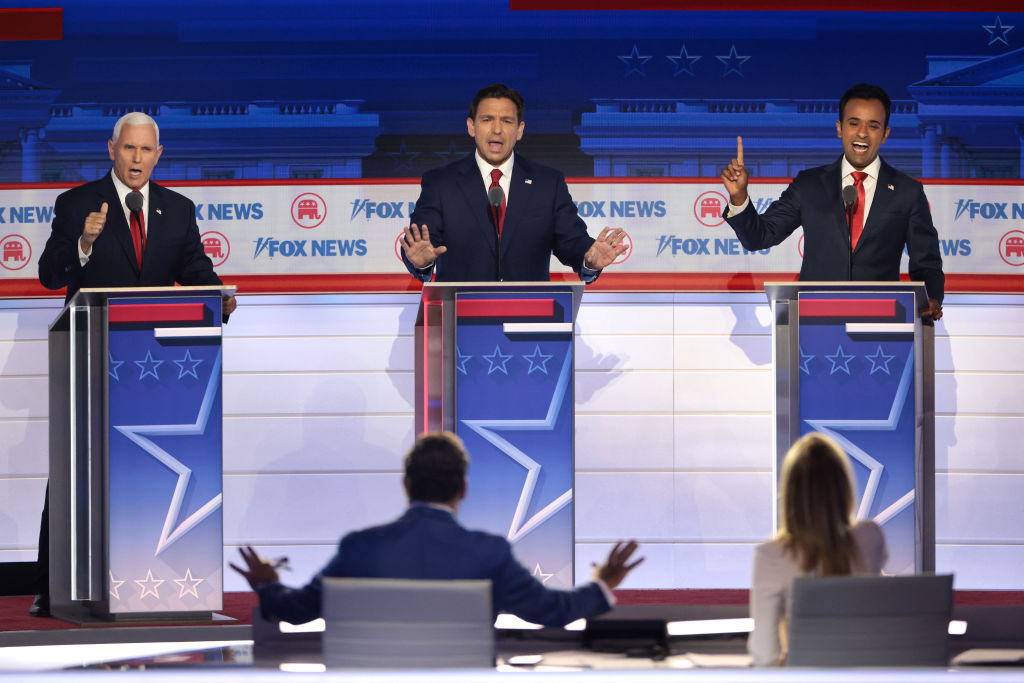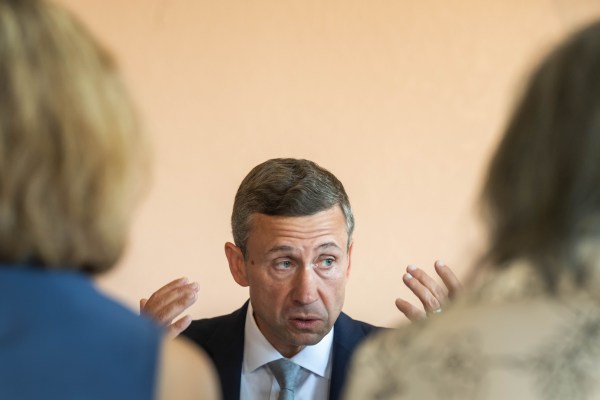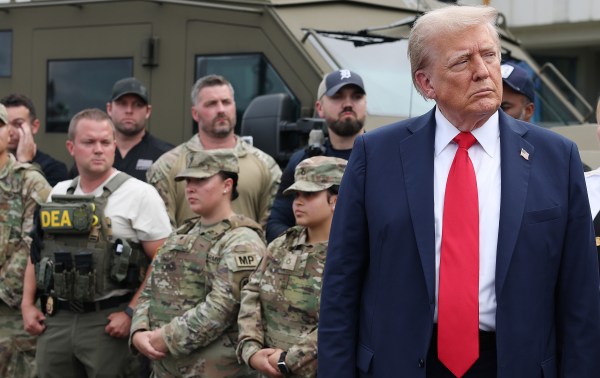Welcome to the post-debate edition of The Collision. We trust you’re nursing that hangover well enough. Today also happens to be the day that the leading candidate for the Republican nomination for president gets his mugshot—so if you self-medicated and don’t remember last night’s debate, don’t worry, the rest of America is soon to forget it, too.
About Last Night
For the first hour of Wednesday’s debate in Milwaukee, the Republican candidates had little to say about the legal jeopardy faced by their party’s frontrunner, Donald Trump. But going into a commercial break at 10 p.m. ET, co-anchor Martha MacCallum teased a block of upcoming questions about the former president’s indictments with a live shot of the jail in Fulton County, Georgia, where Trump will be processed today.
That ominous live shot turned out to have been the most attention Trump’s most recent indictment—alongside 18 associates, over their alleged attempts to pressure Georgia officials to change the outcome of the 2020 election—got during the two-hour debate. If any viewers were expecting a pile-on from the participants on the absent Trump, they didn’t get it.
When the Fox News broadcast returned from commercial, co-anchor Bret Baier asked for a show of hands: Who onstage would still support Trump as the GOP nominee if he is convicted of a crime? Every candidate, save former Govs. Chris Christie and Asa Hutchinson, raised his or her hand. Most, when given the opportunity to explain themselves, went after the “weaponization” of the Justice Department and “political” prosecutions. None of the remaining candidates made any arguments that the charges against Trump in any of the four jurisdictions where he’s been indicted disqualify the former president, and Vivek Ramaswamy even challenged his rivals to follow his lead and commit to pardoning Trump if elected president. (Mike Pence was not amused.)
It was a remarkable collective decision by the field not to use the frontrunner’s chief vulnerability against him. It reflects the broad conventional wisdom, which GOP strategists working for these campaigns espouse, that loyalty to Trump is itself a litmus test for primary voters. “It’s not going to look like Liz Cheney,” one adviser to a candidate told The Dispatch hours before the debate. No lie there.
Even those who were trying to take the Liz Cheney mantle didn’t seem to rise to the occasion. Christie, a former U.S. attorney who has centered his presidential campaign on prosecuting the case against Trump, tried to do so in front of an audience that sure didn’t appear receptive. “Someone’s got to stop normalizing this conduct,” said Christie as he faced some boos from the crowd. “Now, whether or not you believe the criminal charges are right or wrong, the conduct is beneath the office of president of the United States.”
But even Christie seemed to struggle to make the most forceful case against Trump without the defendant himself in the room. Indeed, most of the candidates and even the Fox News moderators seemed loath to delve too deep into the legal stuff, and the discussion soon moved on. And with that, the issue of Trump’s indictments—which is likely to define a general election with Trump as the nominee—seemed to dissipate as an issue for the Republican presidential primary.
About That Law Review Article
Let’s give Hutchinson, the former Arkansas governor who just barely qualified to get onto the Milwaukee stage, his due. He was the only candidate, perhaps ever in presidential debate history, to bring up an as-yet unpublished law review article to bolster his campaign.
In the course of reiterating his view that Trump is “morally disqualified from being president again as a result of what happened on January 6,” Hutchinson made reference to a forthcoming article from conservative legal scholars William Baude and Michael Stokes Paulsen that argues Trump is also disqualified under Section 3 of the 14th Amendment. That’s the section, by the way, that says anyone who has “engaged in insurrection or rebellion” against the Constitution is disqualified from holding federal office—a Reconstruction-era provision designed to prevent those loyal to the Confederacy during the Civil War from holding office in the United States government.
It’s an argument that’s already convinced the conservative J. Michael Luttig and the liberal Laurence Tribe, two legal minds who are otherwise diametrically opposed. Whether it has any purchase with Republican primary voters is, well, pretty clear.
And if you want to get into the weeds on this legal argument, Sarah and David hashed it out on Advisory Opinions earlier this week with Stanford Law School professor and former federal judge Michael McConnell. But perhaps Jonah had the most important point of all:
Let’s say pretty much everyone agrees with Baude and Paulsen. So what? Nothing will happen to keep Trump from running unless someone, somewhere, does something about it. I mean, does anyone think that if they sat Donald Trump down and explained Baude and Paulsen’s argument to him that it would matter to Trump in the slightest? He’d still run—even if he was convinced the argument was right. If Trump knew anything about George Washington, he wouldn’t even agree with King George. He’d think Washington was a sucker for abdicating power. Trump only plays Calvinball.
The question is, “Who will stop him?” Now, some say that state officials can keep him off the ballot based on this 14th Amendment theory. Okay. Let’s say they do that. Trump would obviously challenge that in court and it would go to the Supreme Court. Even though it would cause all sorts of ugly tumult, I’d be fine with the court upholding the decision, if the reasoning was sound. But what a mess that would be.
Sarah’s View
The big winner from last night’s debate was not in question. It was the guy who is 30 to 40 points ahead of everyone else. This wasn’t a “survive to fight another day” debate for the eight people on that stage. Not only does Trump win when the numbers don’t change substantially, but any momentum that a candidate may get from last night will almost certainly be blunted when all attention turns back to Donald Trump’s mugshot coming out of Fulton County tonight.
Donald Trump’s support looked soft six months ago. Far less so today. Why? Because he has dominated all news coverage and conversation through the summer and no other candidate has been able to (and most haven’t tried) to break through. The Trump campaign chose the timing of his surrender—and therefore the release of his mug shot—for tonight and it was as brilliant as it was obvious.
All in all, it is newsworthy that a former president is surrendering—again—to law enforcement. But the wall-to-wall coverage of a black SUV driving down a freeway all reminds me a little too much of the empty podiums from 2016. It all inures to Trump’s benefit.
Eight people stood on stage last night. Many exceeded expectations, but that also means there was no clear winner. And that hurts them all. Like 2016, this has to be a one-on-one race with Trump. The debate made that harder to imagine, not easier.
Sadly, last night’s debate didn’t change the fundamentals of this race.








Please note that we at The Dispatch hold ourselves, our work, and our commenters to a higher standard than other places on the internet. We welcome comments that foster genuine debate or discussion—including comments critical of us or our work—but responses that include ad hominem attacks on fellow Dispatch members or are intended to stoke fear and anger may be moderated.
With your membership, you only have the ability to comment on The Morning Dispatch articles. Consider upgrading to join the conversation everywhere.